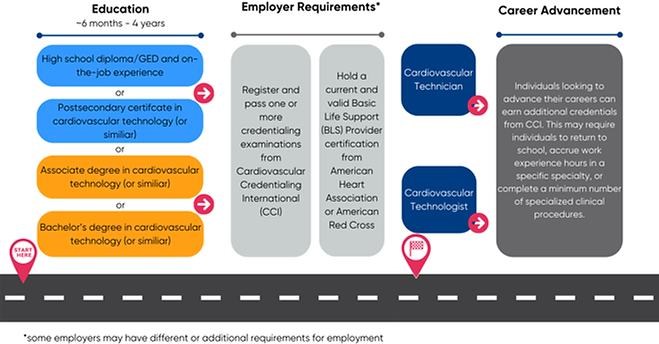
Occupations: Cardiovascular Technologist and Technicians
Cardiovascular Technologists and Technicians
Overview of the profession:
Cardiovascular Technologists and Technicians play a vital role in the healthcare system by supporting Physicians in diagnosing and treating heart and vascular conditions. They perform non-invasive tests, such as echocardiograms, stress tests, and vascular studies, that assess the health of the heart and blood vessels. Because Michigan does not require licensure to practice as a Cardiovascular Technologist or Technician, there are multiple avenues to entering each occupation. To become a Cardiovascular Technician, most employers require or prefer candidates with a high school diploma and work experience or with a postsecondary cardiovascular technology certificate. It is also generally required for those individuals to hold one or more certifications from Cardiovascular Credentialing International (CCI)--with a Certified Cardiographic Technician (CCT) credential being the most commonly requested-- and a valid Basic Life Support (BLS) certification. Similarly, most employers require or prefer that Cardiovascular Technologists hold one or more certifications from CCI and a valid BLS certificate. However, unlike technicians, Cardiovascular Technologists are also commonly required to have completed a cardiovascular technology program at an associate or bachelor's level. Once credentialed, Cardiovascular Technologists and Technicians work primarily in hospitals, Physician offices, or diagnostic laboratories. The expertise of Cardiovascular Technologists and Technicians aids in the detection of cardiovascular diseases, which helps to improve patient outcomes and enhance the quality of care.
Cardiovascular Tech Career Pathway
What is needed to become a Cardiovascular Technologist or Technician in Michigan?
Cardiovascular Technologists or Technicians are not required to hold a state license to practice in Michigan. However, some employers require or prefer Cardiovascular Technicians to have a high school diploma/GED and clinical experience or a certificate or an associate degree in cardiovascular technology (or similar) in addition to a Certified Cardiographic Technician (CCT) from Cardiovascular Credentialing International (CCI) and a valid Basic Life

Support certification. Similarly, some employers may require or prefer Cardiovascular Technologists to hold an associate or bachelor’s degree in cardiovascular technology (or similar), a CCT or Registered Cardiovascular Invasive Specialist (RCIS), or another credential from CCI, and a BLS certification.
What are the differences and benefits of each degree level for becoming a Cardiovascular Technologist or Technician?
Because Michigan does not have licensure requirements for Cardiovascular Technologists and Technicians, employers ultimately determine educational and training requirements. Cardiovascular Technician jobs are typically filled by individuals with a high school diploma or postsecondary certificate. In contrast, individuals with an associate's or bachelor’s degree typically fill Cardiovascular Technologist jobs. Individuals who hold higher-level degrees receive additional training that enables them to earn more CCI certifications and take on additional responsibilities, thus increasing their earning potential.
Upskilling Opportunities
Credentials available through Cardiovascular Credentialing International
-
Advanced Cardiac Sonographer
-
Certified Rhythm Analysis Technician
-
Registered Congenital Cardiac Sonographer
-
Registered Cardiac Electrophysiology Specialist
-
Registered Cardiovascular Invasive Specialist
-
Registered Cardiac Sonographer
-
Registered Phlebology Sonographer
-
Registered Vascular Specialist
Current Workforce Data
We've provided the latest data from Lightcast below. Lightcast gathers and integrates economic, labor market, demographic, education, profile, and job posting data from dozens of government and private-sector sources, creating a comprehensive and current dataset that includes both published data and detailed estimates with full United States coverage.
Click on the images to enlarge them and review them in further detail.

2025 Hourly Wages
10th Percentile | 25th Percentile | Median | 75th Percentile | 90th Percentile |
|---|---|---|---|---|
$18.83 | $24.11 | $37.77 | $40.69 | $44.74 |
Top Posted Job Titles
-
Travel Cath Lab Technologists
-
Cath Lab Technologists
-
Special Procedures Technologists
-
Travel Technologists
-
Cardiac Sonographers
-
Pathology Laboratory Technicians
-
Cath Lab Radiology Technologists
-
Cardiovascular Technologists
-
Cardiovascular Operating Room Registered Nurses
-
Patient Care Technicians
Index Ranking
Ranked 24th (out of 36) "healthiest" profession according to the 2025 Michigan Healthcare Workforce Index.
Learn more here.
2025 Employment: 1,999
Projected 2035 Employment: 1,973 (-1%)
Highlighted Workforce Initiatives
Name: C2 Pipeline Program
Prosperity Region: 10
Description: C2 Pipeline is a program through Wayne State University that has three goals: to increase high school graduation rates, improve academics and help ensure students are college and career-ready. C2 Pipeline has centers for after-school programming in 24 Metro Detroit schools - after-school programming operates for 32 weeks during the school year and it includes tutoring and STEM or healthcare career exploration. C2 Pipeline also offers six weeks of summer programming for students on Wayne State's campus that helps students to experience what college is like while participating in curricula in a variety of topics, including healthcare and STEM. The ultimate purpose of the program is to encourage students to pursue a future career in STEM or healthcare.
Name: Strengthening Community Colleges Training Program
Prosperity Region: 4
Description: The Strengthening Community Colleges Training Program is led by the Michigan Coalition for Accelerated Healthcare Pathways (MCAHP). The program's goals are to increase the capacity and responsiveness of Michigan community colleges in providing a pipeline of skilled workers, and upskill those already in healthcare, to address the needs of employers of allied health professionals. The program offers online hybrid training and apprenticeships to those interested in entering into Allied Health. Future community college program offerings are an Anesthesia Technologist degree and a Cardiovascular Tech apprenticeship. Program received $5 million federal grant from the US Department of Labor to Grand Rapids Community College.
Name: Michigan Workforce Training and Education Collaborative (MWTEC)
Prosperity Region: Statewide
Description: Michigan Workforce Training and Education Collaborative works to provide Michigan residents access to training or education in a desired career field due to limited availability in their community. Their goal is to ensure equitable access for all citizens of Michigan to career pathway education and training, leading to high-paying jobs with advancement opportunities. They provide access to trainings in a variety of health careers. Current Programs include, Anesthesia Tech, Cardiovascular Tech, Community Paramedic, CT Tech, EEG Tech, LPN Training, Medical Assistant, MRI Tech, Radiography, Surgical Tech.








